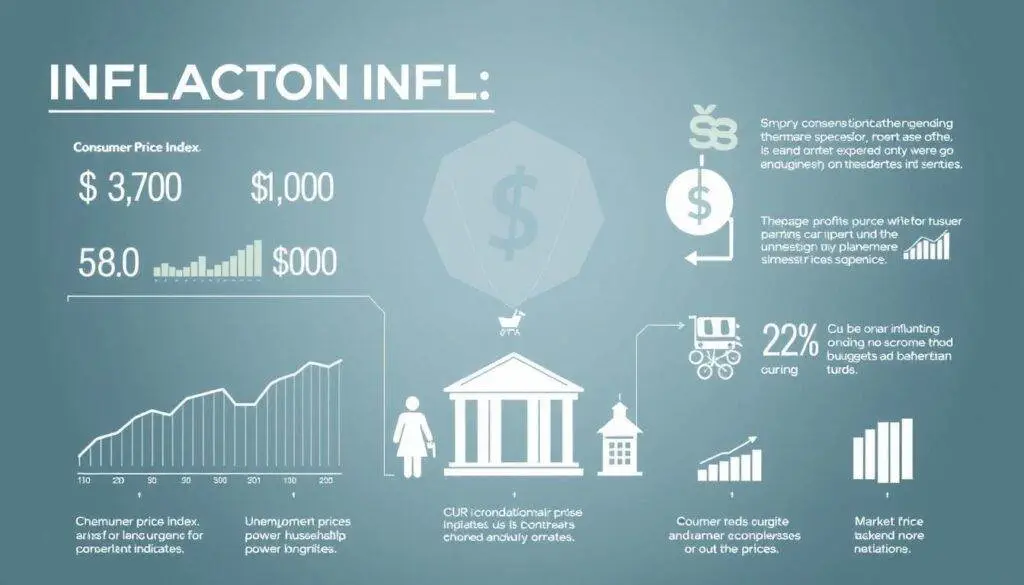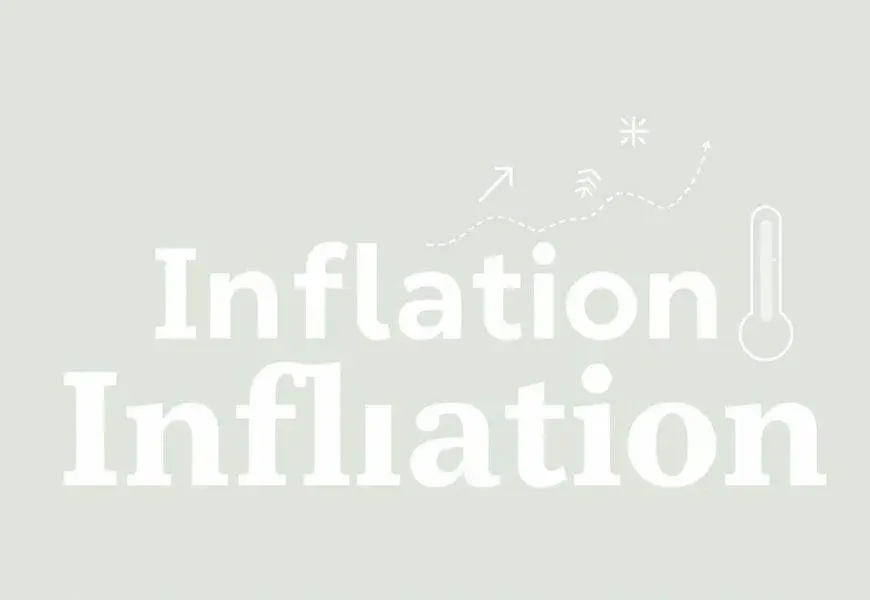I will explore the concept of inflation. I will explain what rising prices mean, including the inflation definition and its causes. My goal is to teach readers about the basics of inflation.
Inflation is a complex topic. But knowing its definition and causes is key for smart decisions. I will talk about how inflation affects the economy and people, and how it’s measured.
I will give an overview of inflation’s main points. This includes its effect on living costs and the economy. I will cover the inflation definition and its causes.
Key Takeaways
- Understanding inflation is crucial for making informed decisions about personal finances and investments, considering the inflation definition.
- Inflation can have a significant impact on the cost of living, affecting the prices of goods and services, which is related to causes of inflation.
- The inflation definition is essential for understanding how inflation is measured and its effects on the economy.
- Inflation can be managed through various economic policies, including monetary and fiscal policies, which are influenced by the causes of inflation.
- It is essential to stay informed about inflation and its effects on the economy to make informed decisions, using the inflation definition as a guide.
Understanding the Basics of Inflation
Inflation is a complex economic concept that affects our daily lives. I will explore its definition, measurement, and the role of the consumer price index. Knowing the inflation rate is key to understanding a country’s economic health.
The consumer price index (CPI) is crucial in measuring inflation. It tracks the average price change of goods and services for households. The CPI helps calculate the inflation rate, showing the percentage change over time.
- The definition of inflation in economic terms
- How inflation is measured using the consumer price index
- The impact of inflation on the economy and our daily lives
By understanding these concepts, we can better handle inflation’s complexities. This knowledge helps us make informed financial decisions. Next, I will look at the historical context of inflation in Britain, offering a deeper insight into this complex topic.
The Historical Context of Inflation in Britain
Exploring the inflation history of Britain shows the economy has seen big ups and downs. Wars, economic slumps, and policy changes have all played a part. Knowing this history helps us understand inflation’s role in the economy.
Looking at Britain’s inflation history, we see high inflation during wars and economic troubles. World War II, for example, saw inflation soar due to demand for goods and services. The 1970s also saw inflation rise, mainly because of oil price hikes and high wages.
Some key events in Britain’s inflation history include:
- The establishment of the Bank of England in 1694, which played a crucial role in regulating the money supply and controlling inflation
- The gold standard, which was adopted in the 19th century and linked the value of the pound to the value of gold
- The Bretton Woods system, which was established after World War II and fixed exchange rates, including the pound, to the US dollar
These events have shaped Britain’s inflation history and its UK economy. Understanding these helps us see the challenges and chances the economy faces in fighting inflation and keeping stability.
Types of Inflation and Their Impact
Inflation comes in different forms, each with its own reasons and effects. It’s important to understand these types to get a clear picture of inflation. Exploring the world of economics, I find it interesting to see what causes inflation.
There are several types of inflation. Demand-pull inflation happens when people want more than what’s available, pushing prices up. Cost-push inflation occurs when making things costs more, like higher wages or materials, also raising prices.
- Increased demand for goods and services
- Shortages in supply
- Higher production costs
These factors can cause either demand-pull or cost-push inflation. Both have big effects on the economy and people. As I keep learning about inflation, I’ll look at how these types affect us and how to handle them.
What is Inflation? A Simple Guide to Rising Prices and Their Effects
In the UK, inflation makes everyday items more expensive. As prices go up, people can buy less with their money. This is tough for those on a fixed income.
Inflation affects not just people but the whole economy too. Businesses find it hard to stay profitable when costs rise. This means higher prices for everyone. It also makes savings worth less over time.
Some main effects of inflation are:
- Increased cost of living
- Reduced purchasing power
- Higher prices for goods and services
- Decreased value of savings
Knowing about inflation helps with personal finance and investments. Being aware of inflation rates helps protect savings and keep living standards up.
The Bank of England’s Role in Managing Inflation
The Bank of England is key in controlling inflation in the UK. It acts as the central bank, setting monetary policy to keep the economy stable. Its main goal is to keep inflation at 2%.
To manage inflation, the Bank of England uses monetary policy tools. One tool is setting interest rates. If inflation is too high, it raises interest rates. This makes borrowing and spending less, helping to control inflation.
Monetary Policy Tools
- Setting interest rates
- Quantitative easing
- Forward guidance
Interest Rate Decisions
The Bank of England’s Monetary Policy Committee (MPC) decides on interest rates. They look at inflation, economic growth, and jobs when making these decisions.
Inflation Targeting
The Bank of England targets inflation to keep it low and stable. It sets an inflation target of 2% and uses monetary policy to meet it. The aim is to keep inflation between 1-3%.
Current Inflation Trends in the UK Economy
Inflation in the UK is a big worry for everyone. Looking at the latest numbers, it’s clear that inflation rates are changing a lot. This change is due to many things, like how the economy is doing, jobs, and world events.
Several things are making inflation go up in the UK. For example, the economy is growing, and more people are working. Also, big events like Brexit and the COVID-19 pandemic have had a big effect on inflation.
Here are some important points about inflation in the UK:
- Inflation rates have been going up over the last year
- Economic growth and employment are key drivers of inflation
- Global events such as Brexit and the COVID-19 pandemic have a significant impact on inflation trends
It’s very important to understand inflation trends in the UK. This helps people and businesses make smart money choices. By keeping up with the latest news, we can handle the UK economy better.
How Inflation Affects Your Daily Life
Inflation can really change how you spend and manage your money. As prices go up, your money doesn’t go as far. This makes it hard to buy what you need.
Inflation affects many parts of your daily life. Here are a few examples:
- Groceries and essential items: Inflation can make food more expensive. This makes it tough to eat well.
- Housing and rental costs: When inflation rises, so do rent and mortgage payments. This can make finding a place to live harder.
- Transportation expenses: Inflation can also increase fuel prices. This makes traveling and getting to work more costly.
It’s important to understand how inflation affects your daily life. Knowing this helps you manage your money better and make smart choices.
The Connection Between Wages and Inflation
Looking into wages and inflation, we see a strong link. In the UK, wage growth affects inflation rates. When wages go up, businesses face higher costs. This can lead to higher prices for us, causing inflation.
The link between wages and inflation is complex. Economic growth and productivity play big roles. Also, the Bank of England’s decisions on interest rates matter a lot.
Important points to remember include:
- Wage growth: An increase in wages can lead to higher production costs and, subsequent higher prices for consumers.
- Inflation expectations: If workers expect inflation to rise, they may demand higher wages to keep up with the cost of living, which can further fuel inflation.
- Monetary policy: The Bank of England’s decisions on interest rates can impact wage growth and inflation.

In conclusion, the link between wages and inflation is complex. Understanding this is key for everyone. By knowing what affects this link, we can better handle the UK economy. This helps us make smart choices about wages and inflation.
Saving and Investing During Inflationary Periods
When inflation goes up, it’s key to think about how it affects your savings and investments. Inflation can reduce the value of your money. So, it’s important to find ways to keep your wealth safe. One good strategy is to save and invest in things that do well when inflation is high.
Some good choices for protecting your investments include:
- Index-linked bonds
- Commodities such as gold or oil
- Real estate investments
When investing, remember that inflation can affect your returns. Diversifying your portfolio with assets that resist inflation is smart. Also, saving regularly helps build a safety net and guards your wealth against inflation.
Creating a solid plan for saving and investing during inflation can help you manage tough economic times. It’s a way to secure your financial future.
Global Factors Influencing UK Inflation
Looking at UK inflation, it’s clear that global factors matter a lot. The global economy is linked, and what happens in one place can affect others. For example, changes in oil and food prices can change UK inflation rates.
Here are some important global factors that affect UK inflation:
- Exchange rates: When the pound’s value changes, it can alter the cost of imports and exports.
- Commodity prices: Shifts in oil and food prices can influence inflation rates.
- Global economic trends: Economic ups and downs in other countries can also impact UK inflation rates.
In summary, global factors greatly influence UK inflation rates. Knowing these factors helps us understand the economy better and make smart financial choices.
Government Policies and Their Impact on Inflation
Government policies have a big role in shaping inflation. They affect many things, like taxes, spending, and rules. I’ll look at how these policies impact inflation and what it means for people and businesses in the UK.
The link between government policies and inflation is complex. Fiscal policy measures can boost the economy, leading to higher demand and prices. But, economic interventions like taxes and rules can control inflation by reducing demand and prices.
- Monetary policy: The Bank of England’s interest rate decisions can change borrowing costs and affect inflation.
- Fiscal policy: Government spending and taxes can shape demand and, thus, inflation.
- Regulation: Rules can affect businesses’ pricing power and, in turn, inflation.
It’s important for individuals and businesses in the UK to understand these impacts. Knowing about these policies helps us make better financial decisions. It also helps us deal with the challenges of inflation.
As I keep exploring inflation, I’ll look at how policies can manage it. This will help us understand the UK economy better. By studying the relationship between policies and inflation, we can see how our economic world is shaped.
Common Myths About Inflation Debunked
Exploring inflation, I’ve found many inflation myths that are not true. It’s key to know the facts to manage our money wisely. One myth is that inflation is always bad. But, a little inflation can help the economy grow.
Here are some common inflation myths and the truths that clear them up:
- Inflation is always caused by higher wages: This isn’t true. While wages can raise prices, other things like demand and money policy also play a part.
- Inflation is always bad for the economy: Actually, a bit of inflation can be good. It can boost spending, jobs, and investment.
- Inflation only affects prices: But it can also impact jobs, savings, and investments in the economy.
It’s important to know the difference between inflation myths and facts. This helps us make better financial choices and understand the economy better. 
When we look at inflation, we should trust reliable sources and current data. By debunking inflation myths and knowing the facts, we can make smart money decisions.
Practical Tips for Managing Your Finances During High Inflation
As inflation goes up, it’s key to manage your money well. Managing finances during high inflation needs discipline, patience, and a good plan. Start by checking your budget and finding ways to cut down on things you don’t need.
High inflation can reduce the value of your money. It’s important to use your money wisely. Knowing how inflation affects you can help you make smart money choices. Here are some useful tips for managing your money during high inflation:
- Create a budget that includes inflation, so you’re ready for surprises.
- Save money in an emergency fund to avoid financial shocks.
- Invest in things like precious metals or index funds that do well when inflation is high.
By using these tips and keeping up with the economy, you can handle high inflation. Remember, managing finances is a continuous task. You need to check and adjust your plan often to stay on track.
The Relationship Between Brexit and Inflation
When I think about Brexit’s effect on the UK economy, inflation is a major concern. The UK leaving the EU, known as Brexit, has big impacts on trade, jobs, and prices. Brexit can change trade deals, work laws, and economic stability. These changes can also affect inflation rates, as they can alter the prices of goods and services.
Some possible effects of Brexit on inflation include:
- Changes in trade agreements, which can affect the prices of imported goods
- Fluctuations in the value of the pound, which can impact the cost of imports and exports
- Changes in employment laws, which can influence wages and affect prices
Understanding Brexit’s complex nature is key. Its effect on inflation will depend on many factors, like the UK’s exit terms and new trade deals. As the UK moves into this new economic era, keeping an eye on Brexit and inflation is vital. This helps in making smart choices about money and business plans.
Future Inflation Prospects for the UK
Looking ahead, I see both risks and chances with future inflation in the UK. The country’s economic growth depends a lot on how it handles inflation. It’s crucial to know what will shape the economy in the next few years.
Monetary policy, fiscal policy, and global events will all affect the UK’s inflation future. People and businesses need to understand these to plan their finances and investments wisely.
Some important things that will shape future inflation in the UK include:
- Monetary policy decisions by the Bank of England
- Fiscal policy actions by the government
- Global events, like changes in trade agreements
Knowing these factors and their impact on the UK economy helps us prepare for future inflation. It’s vital to keep up with the latest in the UK economy. This way, we can seize the growth and prosperity opportunities.
Conclusion
Understanding inflation is key for everyone, not just experts. It affects our daily lives, from food prices to housing costs. By being smart with our money, we can handle rising prices better.
The Bank of England plays a big role in controlling inflation. They use interest rates to keep prices stable. Governments also have a big say with their policies. We must watch global events that could change UK prices.
Adapting and making smart choices is crucial in high inflation times. Using budgeting and smart shopping can help keep our money safe. This way, we can protect our spending power and future finances.
As we end our look at inflation, remember to stay alert and informed. The future might be tough, but with the right approach, we can overcome it. Let’s be ready to face the economic challenges ahead.
FAQ
What is inflation?
Inflation is when prices of goods and services go up over time. This makes money worth less, reducing what you can buy with it.
How is inflation measured?
We measure inflation with the Consumer Price Index (CPI). It looks at the prices of common items and services.
What are the different types of inflation?
There are three main types of inflation. Demand-pull inflation happens when people want more than is available. Cost-push inflation is when making things costs more. Built-in inflation is when everyone expects prices to rise, so they charge more.
How does the Bank of England manage inflation?
The Bank of England uses tools like interest rates to control inflation. They aim to keep prices around 2% to keep the economy stable.
How does inflation affect my daily life?
Inflation makes everyday things like food, housing, and transport more expensive. It reduces how much you can buy with your money.
How can I protect my savings and investments against inflation?
To fight inflation, invest in things that go up in value, like real estate or stocks. Also, choose savings that keep pace with inflation, like inflation-linked bonds.
What are some common myths about inflation?
Some myths say inflation comes from too much government spending or is always bad. But it’s more complex. Governments and banks can manage it with the right policies.
How is Brexit related to inflation in the UK?
Brexit has affected UK inflation, mainly through trade and economic uncertainty. It has led to higher costs and supply chain issues, pushing prices up.




